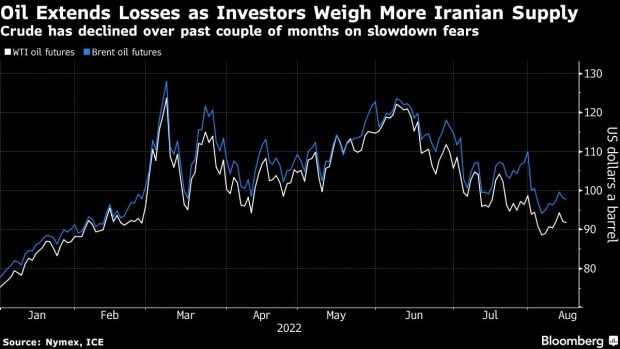Singapore August 15 2022: Oil extended losses at the start of the week as traders weighed concerns about Chinese demand and the prospect for more Iranian supply.
West Texas Intermediate fell toward $91 a barrel after closing 2.4% lower on Friday. China’s central bank unexpectedly cut its key interest rates as it boosts support for an economy hit by virus lockdowns and property woes. The nation’s apparent oil demand last month was about 10% lower year-on-year.
The drawn out process of reviving a nuclear agreement with Iran appeared to inch forward. European Union proposals to revive the deal are acceptable if Tehran can be reassured on various issues including sanctions, according to a report from Iran’s state-run IRNA at the end of last week.
Crude has ticked lower over the past couple of months on concerns about an economic slowdown, shedding all the gains put on following Russia’s invasion of Ukraine. Money managers have cut their bullish bets on WTI to the lowest in over two years, according to the Commodity Futures Trading Commission.
“Renewed Covid lockdowns in China are weighing on demand on top of recessionary worries, while supply concerns have melted away,” said Vandana Hari, founder of Singapore-based Vanda Insights. The prospect of Iranian supply returning adds to the bearish sentiment, she added.
China’s economic recovery unexpectedly weakened in July as fresh Covid-19 outbreaks impacted consumer and business spending. Industrial output rose 3.8% from a year ago, lower than June’s 3.9% and missing economists’ forecast of a 4.3% increase. Oil refining also fell as plants shut for maintenance.
Oil is still up around 20% this year and the surge in energy prices over the first half has underpinned record earnings for producers. Saudi Aramco posted the biggest quarterly adjusted profit of any listed company globally, following its big oil rivals such as Shell Plc and Exxon Mobil Corp.
The Middle Eastern oil giant “expects oil demand to continue to grow for the rest of the decade, despite downward economic pressures on short-term global forecasts” Chief Executive Officer Amin Nasser said.
The outlook for the oil market remains mixed. The International Energy Agency last week raised its forecast for global demand growth this year, while OPEC expects the market to tip into a surplus this quarter. The cartel trimmed its forecasts for the amount of crude it will need to pump.










